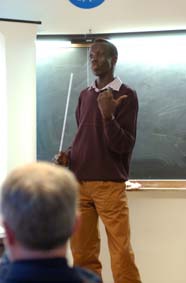Personal tools
News from ICTP 104 - Profile

Former ICTP Diploma Course student, Tino Shawish Nyawelo from Sudan, recently visited ICTP. His journey has come full circle beginning as a student and now returning as a lecturer.
Life's Symmetries

As Tino Shawish Nyawelo
stepped up to the podium to deliver the seminar "Singular
Metrics in Supersymmetric Sigma-Models" this past January,
he could see a number of faces in the audience with expressions
that seemed to match his own just five years ago: "Yes, it's
been a difficult six months," some of the students seemed
to say, "but we think we're finally on our way."
It was in September 1997 that Nyawelo arrived in Italy from his
native country of Sudan to begin an intensive year of study in
the ICTP Diploma Course programme.
"The first six months," Nyawelo recalls, "were
tough. By November, I had become so frustrated that I almost quit.
But both my friends and the Centre's professors--notably, Goran
Senjanovic, my advisor, and Faheem Hussain, then co-ordinator
of the Diploma Course programme in high energy physics--encouraged
me to stay. Heeding their advice and concerned about how I would
explain to my family and colleagues why I had come home empty
handed, I decided to stay."
Nyawelo took his first set of exams in January--and passed. "That
was the turning point. Things became easier for me after that."
Language had something to do with Nyawelo's slow, frustrating
start. "Although both my parents speak English and I am fluent
in the language, my studies at the Sudan University of Science
and Technology in Khartoum were in Arabic. We had no textbooks.
Consequently, my knowledge of physics and mathematics was based
entirely on the lecture and classroom notes that I had taken.
The fact is that I didn't know the terminology when I arrived
at ICTP. Even the simplest concepts carried names that were foreign
to me."
Once he overcame the 'language' problem, Nyawelo faced another
serious obstacle. Upon learning how to understand and speak in
the classroom, he soon realised that he did not know as much as
many of the other students. "Diploma students begin their
studies here in Trieste with vastly different levels of knowledge
and skills. My knowledge and skills were not very high. So I had
to study especially hard to catch up."
And catch up he did. Nyawelo received his graduation certificate
from the Diploma Course programme in September 1998. He was then
appointed a visiting scientist at the National Institute for Nuclear
and High Energy Physics (NIKHEF) in The Netherlands. He entered
the doctorate programme at NIKHEF in 2000 and expects to receive
his degree sometime early next year.
"My research--from the time of my Diploma Course thesis at
ICTP to my doctoral thesis at NIKHEF--has always focussed on the
geometric and algebraic aspects of supersymmetry. More specifically,
I construct mathematical models related to the fundamental interactions
of subatomic particles."
Nyawelo's efforts not only mark a personal triumph but also hold
significant promise for his native country of Sudan.
"My doctorate degree in high energy physics, with a special
focus on supersymmetry, will make me the only person in Sudan
with a Ph.D. in this field. In fact, there are only 10 to 15 Sudanese-born
professors with Ph.D.s in any field of physics in the entire country."
Their efforts are supplemented by contract professors from Iraq,
Syria and several other nations. In addition, institutes like
Leiden University and the University of Amsterdam have visiting
professorship programmes with universities in Sudan that enable
physics professors from The Netherlands to spend a couple of weeks
there each year.
"Given the circumstances," Nyawelo notes, "one
person with a doctorate can make an enormous difference."
In fact, Nyawelo's value to his home country is already being
felt. "I am on the faculty of the Sudan University of Science
and Technology's physics department and returned there in 2000
and 2001 to interact with teachers and students. It's an arrangement
that I hope to continue while spending several years as a postdoctorate
in Europe or the United States."
In the meantime, Nyawelo will continue to work on research problems
related, for example, to 'singular metrics in supersymmetric sigma-models,'
'holomorphic killing vectors,' and 'the particle spectrum in the
unitary gauge.'
As Nyawelo's facility both with these words and concepts clearly
convey, the terminology that physicists and mathematicians use
to communicate no longer poses an obstacle to his success. Indeed
they have become the 'mastered' tools of his trade.